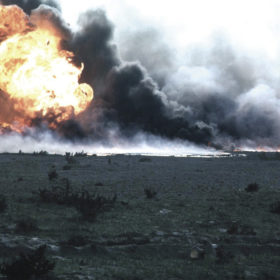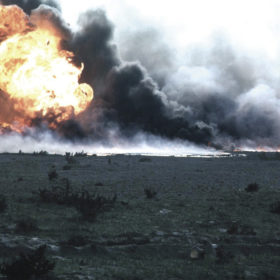The long read: New fuels, new powers

The energy transition will change the geopolitical landscape, which has hitherto observed closely who controls the production and trade of hydrocarbons. The current ambition to find alternative sources of power has given impetus to a growing academic community to determine the probable geopolitical outcome of the energy transition. Renewables do not mutually share most of the unique features of fossil fuels, which translate into power political effects. So how should we understand the world of tomorrow?
From pv magazine 05/2020
The causal relationship between geography and the power of states, determined by their access to natural resources and their means of transporting them, has become an essential field for scholars and laymen to understand the world of conflict and alliance geopolitics. With fossil fuels being the driver of industrialization and a source of power in every sense of the term, the question of what will happen now that fossil fuels are declining comes to the fore.
One of the underlying assumptions about the energy transition is that there will be a shift in the way energy is concentrated around the world. “Some countries have a lot [fossil fuels], and very many countries have little or nothing. Whereas, with renewables, they are much more evenly distributed. Some have more, some have less, but all have some,” explains Indra Overland, head of the Center for Energy Research at the Norwegian Institute for International Affairs (NUPI).
Whether that automatically leads to less conflict is a question which demands a nuanced answer. Overall, it can be argued that there will be less mutual interdependency between countries. So, countries that rely almost entirely on energy imports, usually in the form of fossil fuels, are freed of that burden. That is the case even if the technologies for harvesting and storing renewable power have to be imported, or the companies financing and realizing these projects are foreign. There is still a reduction in import dependency and an apparent reduction in market volatility for fuels. A small excursion into international relations theory will show that literature is divided on the fact that interdependency is driving either peace or conflict. The arguments are that dependency provides a subject to have a dispute over, or if you are on the other end of the spectrum, dependence means countries refrain from overt conflict as it would likely fall back on them.
Overland explains that irrespective of which theoretical approach proves correct, it is likely that there will be less exacerbated and long-distance wars over energy resources. “Sweden will not import solar power from Saudi Arabia,” he explains. But he does concede that “bickering” about the nature of high-frequency energy trading, to offset renewables intermittency, could occur between neighboring states. However, because of the mutual dependence on each other’s energy system, this is more likely to remain at periodic “bickering.” Outright wars are much less likely to occur now, the researcher stipulates, adding that World War II marked the height of armed conflict about energy resources.
New resources
While renewable energy is spread across the globe more evenly, the resources that are required to harvest and store the power of the sun and the wind could become the reason to fight wars. The European Commission’s scientific arm, the Joint Research Center (JRC), issued a report estimating the resource demand for the European Green Deal and pointing to potential chokepoints.
Reportedly, there could be shortages in germanium, tellurium, gallium, indium, selenium, silicon, and glass. Those shortages are not per se because the element is geologically scarce, but rather that the commodity market conditions for these resources are either unfavorable or likely could not keep pace with suddenly skyrocketing demand. Also, critical minerals, Overland explains, are not exactly scarce.
In his journal article “The geopolitics of renewable energy: Debunking four emerging myths”, Overland explains that a lot of the concern was sparked by an episode in 2010 when China imposed an embargo on Japan pertaining to 17 rare earth elements.
Technological developments still to come are what give Overland confidence that these elements don’t have the same geopolitical potential for escalation as oil and gas. The 2010 episode triggered a lot of innovation in the following years, weakening the power that could be exerted from these resources.
Similarly, the researchers at the JRC concluded that most resources relevant to renewables are unlikely to become scarce and trigger conflict. The team made this conclusion on the back of the observation that material intensity for the production of renewable energy components has dropped significantly in recent years and will likely fall further.
In 2004, each watt of crystalline silicon modules needed 16g of silicon. Fourteen years later, that figure had dropped down to 4g/W, and looking further out, the JRC expects this metric to further decrease to 2.1-3 g/W, by 2028. Overland adds that he believes the rapid technological advancements in the renewable energy industry are also likely to change the material requirements. So, while some materials appear scarce right now, research institutes are most likely working to find substitutes to become less dependent on costly, conflict-prone, and volatile imports of them.
Battery by example
With much criticism about the sustainability of lithium and cobalt used in battery production, a lot of battery research today is devoted to omitting the use of these elements. And with vanadium redox-flow batteries, already in commercial use, and sodium and potassium batteries potentially on the horizon, it does not appear that the notion of replacing critical minerals with alternatives seems like an unreachable aspiration.
Still, if a country, previously scarcely equipped with economic resources sits very suddenly on enormous reserves of now very valuable minerals, it can be a source of conflict and economic degradation, a process known as the resource curse. “I think these newly valuable resources can drive conflicts, maybe more at the domestic level than at the international level,” Overland explains. He suggests that Bolivia is an example of a country that doesn’t benefit much from its lithium riches amid the uptick in demand for the element. DR Congo also struggles to translate its cobalt resources into direct socioeconomic benefits for its population.
Overland says that similar observations have been made in the past for gold, diamonds and other materials that are highly concentrated and become very valuable in a short time period. As the resource curse can materialize in a civil war, authoritarianism, and other forms of violence and political instability, the availability of a resource suddenly vital for the global energy supply can wreak havoc in a particular region. This is particularly true, if a country lacks the political capacity to regulate its mining sector. The same function applies to fossil fuels, a fact that is exemplified in the struggle of Venezuela to turn its abundance of fossil fuel into widespread prosperity.
Winner and losers
The rise of fossil fuels as the primary driver of industrialization and modernity has accumulated an incredible amount of wealth and political power in some countries. A decline in demand for these fuels will likely reduce the wealth and power of these nations and will most likely have adverse effects.
NUPI has created the so-called Geopolitical Gains and Losses Index (GeGaLo Index) to determine which countries will improve their economics and power relations as a result of the energy transition and which will likely become less significant in that respect. “It is based on current fossil fuel production and resources, which are counted as a loss. Then we look at how much renewable energy resources these countries have, which is a gain in the sense that it is something that they have,” says Overland, who worked with a team to develop the index.
Overall, the vast majority of countries will gain from the energy transition. This is because the majority of nations are dependent on fossil fuel imports, which is a tremendous burden for economies. The practice of having to import all fuels tips the trade balance in one direction, which can only be readjusted at substantial effort. In this regard, the energy transition will be helpful for a lot of countries.
Also, on the side of the winners, there will be some countries that can significantly improve their socioeconomic standing if they can handle the resource curse, Overland explains. The nature of the geopolitics of energy will shift from controlling access to energy carriers and the trade in them to technology and intellectual property rights, as it will have immense economical and domestic security benefits.


